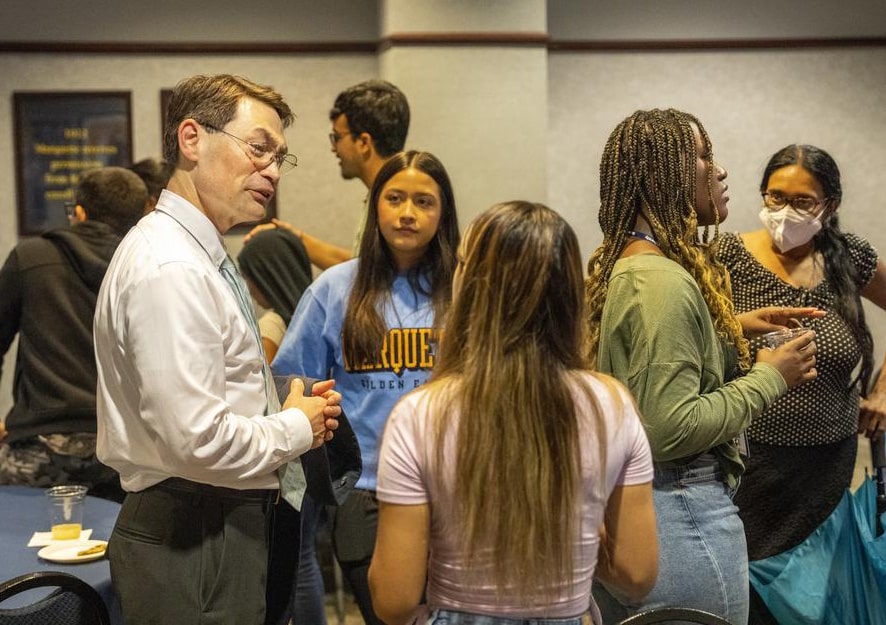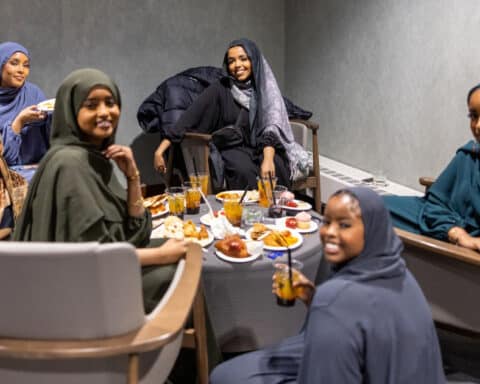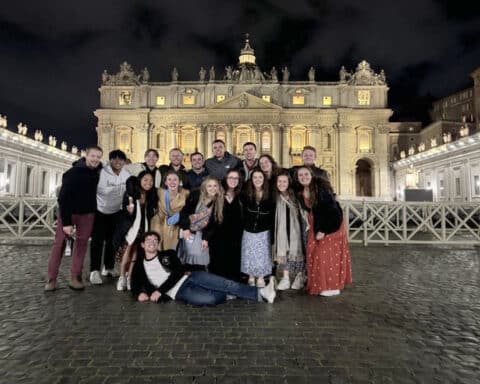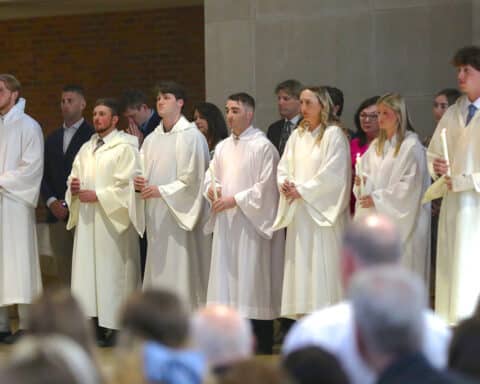Embracing their identity, Catholic universities and colleges nationwide are welcoming students of all backgrounds, including first-generation students — students generally defined as those whose parents did not complete a four-year degree in the United States.
These higher-education institutions want their first-generation students to know that they are not alone and that they will be accompanied every step of the way.
“Please know there are many of us who want to walk with you and join you in your journey so that you can thrive and not just survive college,” Marilyn Jones, director of the Lemonis Center for Student Success (LCSS) at Marquette University, in Milwaukee, Wisconsin, said. “My invitation to first-gen students is to open their hearts and allow themselves to welcome the support, knowledge and resources that we have put in place for them.”
Jones, along with representatives at College of the Holy Cross in Worcester, Massachusetts, University of Dallas in Irving, Texas, and University of Dayton in Dayton, Ohio, spoke with Our Sunday Visitor about the myriad of programs they offer first-generation students. These educational institutions offer everything from special scholarships and peer mentorship to tailored events and workshops.
Surveys suggest a need for extra support: According to a 2021 Pew Research Center analysis, adults with at least one college-educated parent are far more likely to graduate from college than those with parents who are less educated.
Jason Reinoehl, vice president for strategic enrollment management at University of Dayton, recognized that first-generation students face unique challenges and explore many questions, from how to know the difference between grants and loans to how to register for classes.
“Don’t forget: You are the first in your family to go to college,” he stressed. “But you are also a part of a larger community of people who have navigated the same questions.”
First-generation students by the numbers
The universities and colleges that spoke with Our Sunday Visitor educate hundreds to thousands of first-generation students.
Jones, a first-generation graduate herself, revealed that more than 1,650 students, or between 22-25% of the undergraduate student population at Marquette, are first-generation students.
At University of Dallas, Matthew Spring, director of academic success and first generation initiatives, shared that, for fall 2023, 206 of their undergraduate students, or around 15%, attended as first-generation students.
Jerrel Burgo, director of student inclusion and belonging in the Office of Justice, Equity, Belonging, and Identity (JEBI) at Holy Cross, said that, as of the fall 2023 semester, 15% of the student body identifies as first-generation.
At University of Dayton, Reinoehl shared that around 10% of undergraduates — more than 800 — are first-generation students.
Online resources
Many of these colleges and universities provide a wealth of information online for prospective and current first-generation students. Some of them, such as Marquette and University of Dallas, list first-generation students, faculty, and staff for networking or mentoring.
On its website, Holy Cross highlights a mentor network and other resources, such as a first-generation student success guide. Marquette also offers a first-generation student guide and other resources online tackling everything from financial aid and employment to classroom etiquette.
University of Dayton’s website includes information about support for studying abroad and resources for first-generation students and their families, including financial information and definitions for academic terminology.
Peer support
Many of these universities and colleges highlighted peer mentorship opportunities for first-generation students.
“Our Small Groups program consists of 15 peer mentors who are first generation students and facilitate various events such as study halls, roundtable meetings and discussion groups,” Judith Barrera, an academic success specialist at University of Dallas, described.
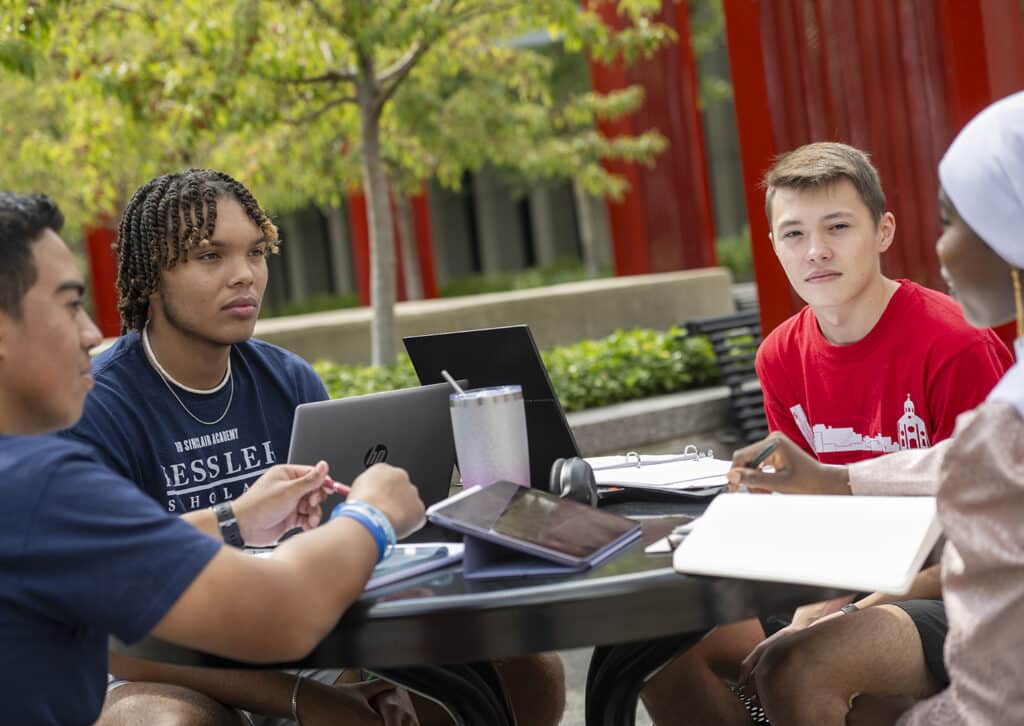
Academic adviser Ana Henriquez shared some of the concrete benefits, saying that these groups “provide an avenue for students to get to know each other, discuss challenges and how to rise above them, and network with other UD students and alumni.”
Holy Cross’ Odyssey program and Marquette’s RISE program — transitional programs that serve many first-generation students — also offer peer mentoring.
Marquette, Jones said, also offers first-year experience courses that help these students navigate the hidden curriculum, develop a sense of belonging, and connect them to faculty and peers.
Financial support
As a part of welcoming first-generation students, these colleges and universities work to provide or connect students with financial support.
“New this year is our Kessler Scholars program for first-generation students in our UD Sinclair Academy,” Reinoehl said of University of Dayton’s partnership with the local Sinclair Community College that enables students to begin their degree at Sinclair before finishing it with University of Dayton.
“These scholars receive financial assistance; a summer introductory program designed for them; a dedicated success professional to help them navigate questions and challenges; the benefit of programming with their fellow first-generation students in the program; and more,” he described.
University of Dallas, Henriquez said, offers a first-generation scholarship for Texas students, funded by the Constantin Foundation.
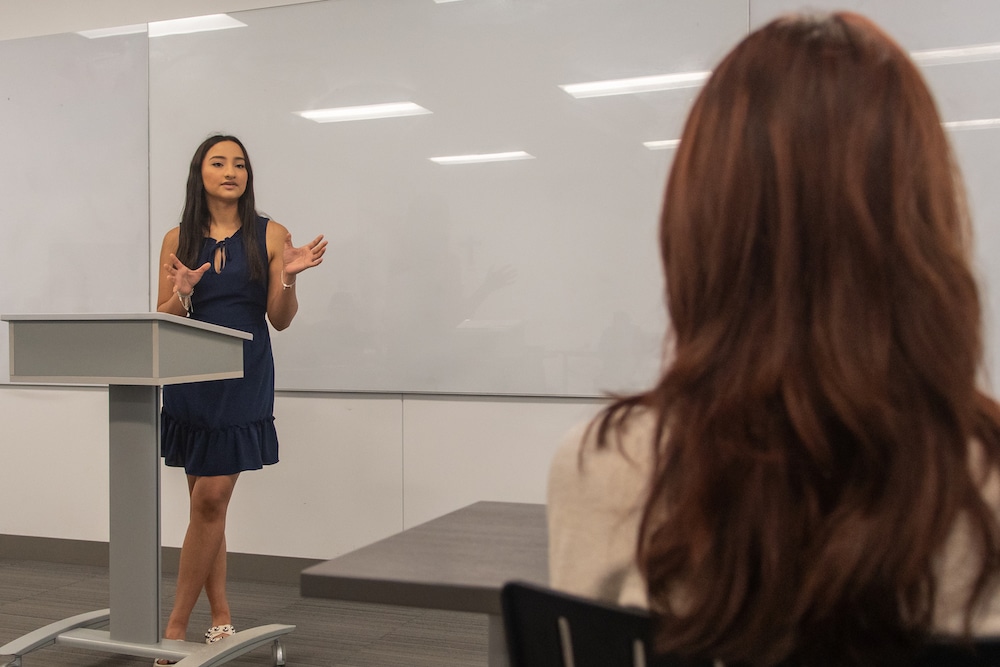
“This scholarship often makes the difference for students who need support financially, as well as academically and socially,” Henriquez said, adding that applicants must meet with academic success staff and participate in the small groups program.
Jones referenced Marquette University’s Urban Scholars Program, which provides full-tuition scholarships to local high school seniors, with priority given to first-generation students.
On-campus resources
Several universities and colleges collaborate to continue offering existing programs while adding new ones for first-generation students.
Jones highlighted LCSS, a new center led by her at Marquette that is scheduled to open this year, as a hub for academic services and a network of support, including for first-generation students.
She also pointed to already-established programs for first-generation students such as Educational Opportunity Program, an academic program, and Project BEYOND-2, for nursing students, which work directly with many first-generation students.
At Holy Cross, Burgo said that his office, JEBI, chairs a committee of diverse faculty and staff who meet regularly to discuss support for first-generation students. This committee, he said, hosts events and works on programs that raise awareness and support students’ academic, social and professional development.
He also announced new initiatives at Holy Cross.
“In the spring 2024 semester, the JEBI Office will begin hosting monthly discussion forums called, C.A.F.E. or Creating Awareness for First-generation Experiences,” he said. “In these forums, there will be discussion topics about first-generation experiences with opportunities for faculty, staff and students to connect, create awareness and gain insight.”
Special events
Many of the colleges and universities organize special events for first-generation students.
Marquette’s The Center for Engagement and Inclusion (CEI), among other things, hosts monthly “First Gen Fridays” that highlight first-generation student achievement and connect students.
University of Dayton also holds events, such as “First Gen Flyer Night,” where students can meet other first-generation students and learn about available resources.
At Holy Cross, Burgo shared, students can attend mixers each semester and meet other first-generation students as well as faculty and staff who are first-generation graduates.
Professional preparation
Catholic colleges and universities work for the success of their first-generation students on campus and beyond.
At Holy Cross, the JEBI-chaired committee hosts events with campus partners, from financial literacy and resume workshops to graduate school information sessions.
Marquette offers “First Gen Professional Development” workshops with its career center on everything from resume building to interview skills. It also hosts “First Gen Connect,” an evening of storytelling and conversation with first-generation employer guests, while celebrating “First Gen Week” in November.
The role of Catholic institutions in welcoming students
All of the colleges and universities that spoke with Our Sunday Visitor addressed the importance of welcoming first-generation students as Catholic institutions.
“We follow our Marianist tradition of valuing every person and their background, and working and learning together for the greater good,” Reinoehl at University of Dayton said.
Burgo at Holy Cross and Jones at Marquette emphasized their Jesuit tradition in educating and caring for the whole person, including that of first-generation students.
As a Catholic institution, Henriquez said that University of Dallas is called to be universal in welcoming all students and, in particular, those who may be at a disadvantage in accessing education.
“It may help to remember that St. Peter (and indeed, many of the apostles) might be called ‘first-generation’ students, for he came from a family of hard laborers, not of trained rabbis,” she commented. “He may not have known all of the intricacies of Jewish theology, but he had a heart that longed for truth.”
“Just as Christ welcomed all to hear him teach,” she said, “so must we welcome all who wish to learn.”

